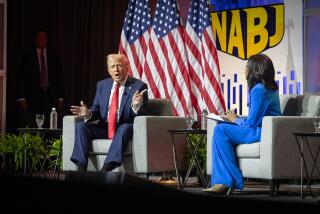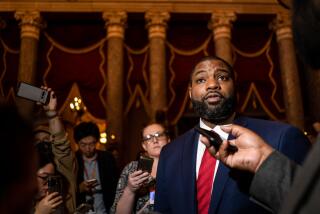Edwards puts on a brave campaign face
- Share via
CLEVELAND — John Edwards, the second-try presidential candidate with the third-place campaign, walked on to Mariah Crenshaw’s lawn this week, surrounded by a mini-circus of reporters and cameras.
The mannequin-perfect looks of 2004 were still there. So was that North Carolina accent — the one that is to ears what sweet pickles are to tongues.
“Nice to see yew,” said the candidate, shaking Crenshaw’s hand. “I’m lookin’ forward to talkin’.”
Edwards has made predatory lending a big focus of his current presidential campaign, and Crenshaw claims she is the victim of such a loan. So the man who made his fortune as a trial lawyer stepped in front of the cameras and tried her case in the court of public opinion.
“This is not complicated. It’s wrong!” Edwards said forcefully. “These people are being taken advantage of.”
Crenshaw, a teacher who is disabled, was grateful that Edwards had lavished such attention on her foreclosed house. But it wasn’t enough to earn her vote — not with this season’s bumper crop of alluring Democratic candidates.
“They’re all so charming, and they all have this compassion and fire about them, don’t they?” she said. “It’s a hard choice.”
Such are the trials of John Edwards. His main Democratic rivals, Sens. Barack Obama and Hillary Rodham Clinton, have bested him thus far in fundraising and national polling. A $400 haircut has generated more buzz than many of his policy positions.
And yet the Edwards machine keeps rolling along, reintroducing Americans to a brand they got to know in 2004: the whip-smart lawyer with the youthful mien and modest mill-town past. He remains confident that Democrats flirting with other candidates will warm to him again, attracted by the fine print of his platform and an accrual of political maturity that he calls “seasoning.”
“I spent a lot of time, last time, thinking about being a good candidate,” Edwards said in an interview this week in Pittsburgh. “I spend my time now thinking about what I want to do as president. That’s a very different mind-set. I think it changes the way you appear to people. And it changes the weight that you have.”
If Edwards were looking for forums to display his new gravitas — the trait critics have accused him of lacking — he found them this week, in his three-day “Road to One America” tour, which sought to highlight the plight of the working poor. For the Edwards’ campaign description of this road trip, click here. For the campaign’s description of Edwards’ poverty program, click here.
He met with struggling homeowners, recovering addicts and poultry workers, listening to their stories. As he did so, he showed the world the new face of John Edwards. Gone, for the most part, was the megawatt smile of 2004. In its place was a face furrowed in solemn concern.
On the road this week, he met the enthusiastic and the indifferent, as well as a third, more vexing category of voters: liberal-leaning Americans who were excited to see him but unwilling to commit.
Patrisha Parker, 36, walked alongside the candidate as he toured Crenshaw’s Mount Pleasant neighborhood. She liked the fact that Edwards, 54, seemed more serious but still young. “We need a youthful president,” she said.
Then she added: “I’m still not going to vote for him.”
Signature issue
Edwards kicked off his tour in New Orleans’ Lower 9th Ward. He was dressed in jeans and a blue dress shirt, the sleeves rolled halfway up his forearms. He walked a devastated block with housing advocates and listened intently with that resolute, squinting face. Camera crews ambled all around.They stopped at the trailer of Henry Phipps, 63, who was still rebuilding his house. He was wearing a Dickies work shirt and a bemused grin.
He gave Edwards a progress report on his house.
“You gettin’ any help from anybody?” Edwards asked, huddling in close with the man.
“No, I ain’t get no help,” Phipps said with a laugh.
“Did you think about goin’ somewhere else?”
“Oh no, I ain’t ever think about goin’ somewhere else.”
“Cuz this is your home, huh?”
“Yeah.”
“We’re proud of you,” Edwards said, gripping the man’s hand. “Proud of you.”
As the crowd moved on, Phipps said he was impressed.
“I reckon I’d vote for Mr. Edwards,” he said. “Ain’t nobody else come down here. That’s very nice of him.”
Edwards insists that his focus on poverty is “not a political strategy,” but more like a calling. Having a signature issue may help differentiate Edwards from his competitors, said Alan Abramowitz, a political science professor at Emory University.
“He’s trying, I think, to reinforce the idea that he’s a serious guy, and interested in serious issues that other candidates are not focusing on,” Abramowitz said. “At the same time, he’s trying to appeal to an important constituency of the Democratic Party, which is not necessarily the poor themselves, but liberals.”
After New Orleans, Edwards went to a church in Canton, Miss., leading a discussion on work conditions with about a dozen poultry workers. A handful of other residents had come to see him in action. Among them was Eric Gilkey, a county worker and Iraq war veteran.
Gilkey wanted to hear Edwards talk about ending the war. He wanted to hear Edwards’ take on immigration because many of his fellow blacks here competed for jobs with Latinos. What Gilkey got instead was a half-hour discussion of the troubles in the poultry industry.
“What’s been your experience with dangerous work conditions?” Edwards asked the workers, as if taking a deposition.
“What happens if while you’re supposed to work, you have a sick child and don’t have anybody to take the child to the doctor?”
When it was over, Gilkey hadn’t changed his preferences: first came Clinton, then Obama, then Edwards.
“He didn’t talk on the issues,” Gilkey said. “So I really didn’t get anything out of it.”
Edwards seemed to shine brightest when he took center stage as an orator. The former trial lawyer is still a smooth, impassioned speaker with a nuanced grasp of a crowd’s emotional timbre.
In Memphis, Edwards’ appearance at an interfaith thrift store was preceded by a jubilant performance of the First Baptist Church’s gospel choir.
He took the podium and turned to the singers. “The Lord is in your voices,” he said. “We can feel it — all of us can feel it.”
He began stringing together the stories of the impoverished people he had met.
“They told us about the extraordinarily dangerous conditions under which they work, and the difficulties they have because they don’t have any sick leave,” he said of Canton’s poultry workers.
A few minutes later, he was leading the crowd of mostly white Memphians in a call-and-response pledge to join his anti-poverty crusade:
“I’ve had reporters asking me all day long the same thing ‘Why do you talk about this issue? This is not a good political issue! The American people don’t care about this.’
“Is that true?”
“NO,” the crowd roared.
“Is that true?” he yelled again.
“NO!
“Do we care?”
“YES!”
Quick stops
His tour schedule was an ambitious one, with eight states to cover in three days. Unlike Bill Clinton, another charismatic Southerner, Edwards rarely lingered with voters beyond the deadlines set by his handlers.Even on a tight schedule, however, Edwards could make an impression. In the small, struggling city of Marks, Miss. — where the best jobs are often in the casinos of Tunica, 30 minutes away — Edwards galvanized a crowd with a brief stump speech at an outdoor barbecue.
“People who are working ought to be paid a decent wage so they can support their families!” he said.
The crowd roared. Later, Mayor Aubrey Collums gave Edwards the key to the city, accidentally calling him “Sen. Kennedy.” It was, apparently, a reference to Robert F. Kennedy, who made poverty a central issue in his 1968 campaign.
In Marks, at least, no one stopped to point out the mistake.
More to Read
Sign up for Essential California
The most important California stories and recommendations in your inbox every morning.
You may occasionally receive promotional content from the Los Angeles Times.










